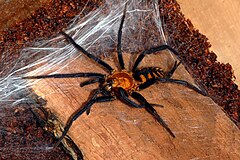Dipluridae
| Funnel-web tarantulas Temporal range: Norian-Recent |
|
|---|---|
 |
|
| Linothele fallax | |
| Scientific classification | |
| Kingdom: | Animalia |
| Phylum: | Arthropoda |
| Subphylum: | Chelicerata |
| Class: | Arachnida |
| Order: | Araneae |
| Infraorder: | Mygalomorphae |
| Family: |
Dipluridae Simon, 1889 |
| Genera | |
|
See text. |
|
| Diversity | |
| 24 genera, 185 species | |
 |
|
See text.
The family Dipluridae, known as curtain-web spiders (or confusingly with other distantly related ones as funnel-web tarantulas) are a group of spiders in the infraorder Mygalomorphae, that have two pairs of booklungs, and chelicerae (fangs) that move up and down in a stabbing motion. A number of genera, including that of the Sydney funnel-web spider (Atrax), used to be classified in this family but have now been moved to Hexathelidae.
Dipluridae lack a rastellum (stout conical spines) on their chelicerae. Their carapace is characterized by the head region not being higher than the thoracic region. Their posterior median spinnerets (silk-extruding organs) are much shorter than their posterior lateral spinnerets, which have three segments, and are elongated (almost as long as their opisthosoma). Most of the species are medium to small-sized spiders, with some, such as the endangered Microhexura montivaga, as small as 3 mm, while others may measure about 15 mm. The cave species Masteria caeca is eyeless.
Members of this family often build rather messy funnel-webs. Some build silk-lined burrows instead of webs (Diplura, Trechona, some Linothele sp.). They generally build their retreats in crevices in earthen banks, the bark of trees, under logs or in leaf litter.
Dipluridae occur almost worldwide in the tropics. Most are found in Central and South America, and many occur in the Australian region. Indothele is found in India and Sri Lanka. Ischnothele is a neotropical genus, but one species occurs only in India. Several genera are found in Africa, with Thelechoris also occurring in Madagascar. Leptothele and Phyxioschema suthepium are endemic to Thailand, with the other Phyxioschema species found in Central Asia. Masteria is widely distributed, with species found in places such as Central America, Fiji, the Philippines, Queensland and New Guinea.
...
Wikipedia
